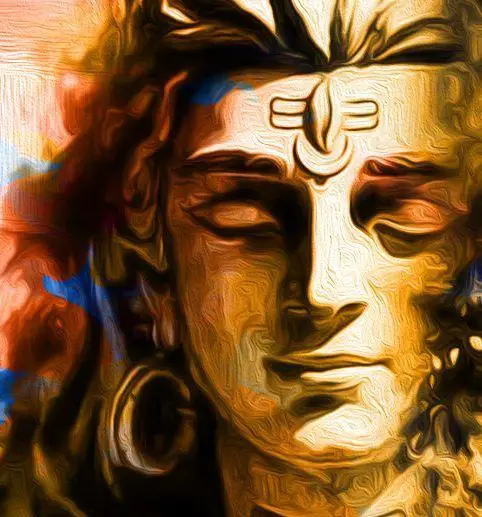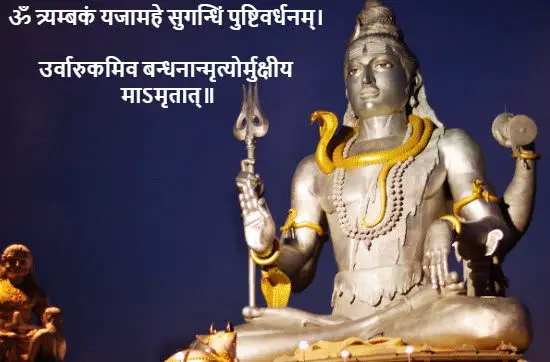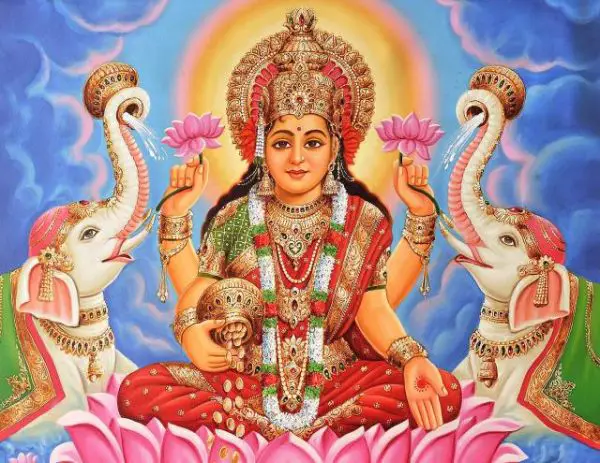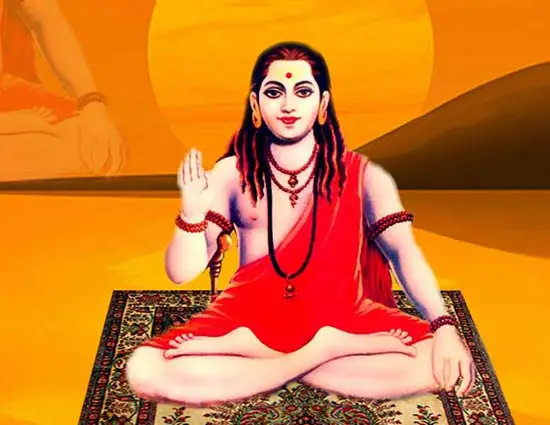Here, we share with you Gajendra Moksha Stotra Benefits and Lyrics. Let’s begin:
Table of Contents
What is Gajendra Moksha?
Gajendra Moksha is a magnificent bhakti hymn from the Bhagavata Mahapurana. It has been addressed to Lord Vishnu by Gajendra, the King of Elephants. The Gajendra Moksha Stotra embellishes the knowledge of Jnana and Vairagya contained in the Upanishads.
The Gajendra Moksha Stotra has been mentioned in the 8th Skanda and third chapter of Srimad Bhagavatam. Lord Vishnu comes down to earth on the call of Gajendra to protect him from the clutches of death of a Crocodile.
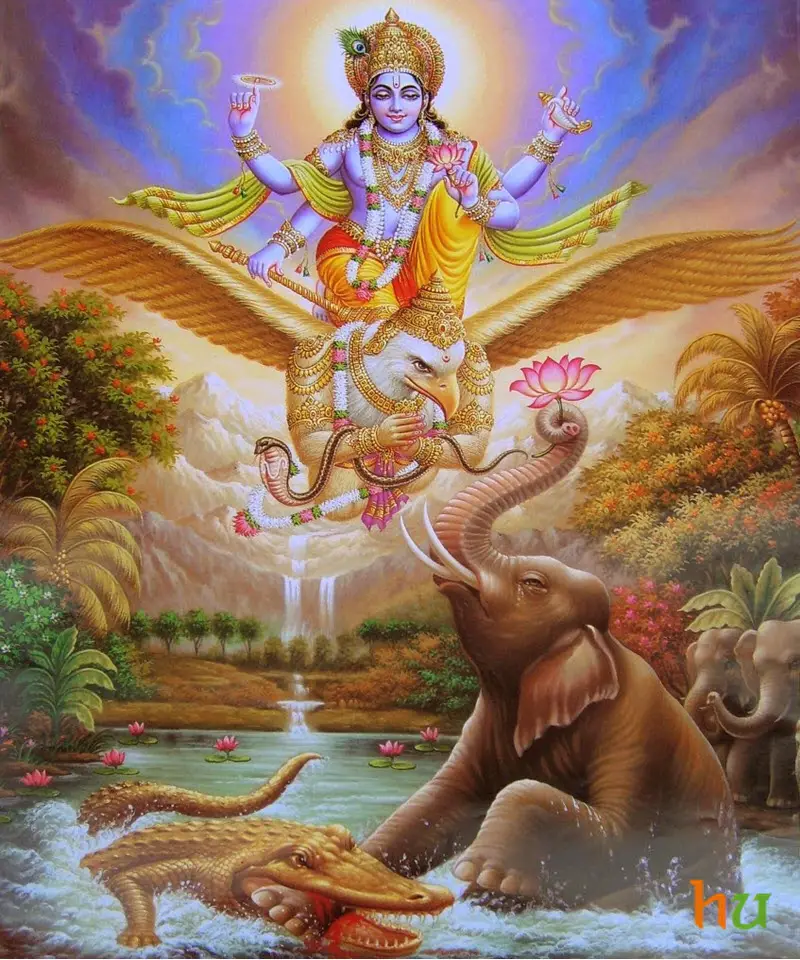
It is believed that whosoever recites this Stotra gets the power to face any difficulties in life and come out of unwanted situations.
The story has been etched amidst the secluded valleys of Mount Trikota, surrounded by lakes and rivers, and had a beautiful garden that belonged to Varuna, the Lord of the Oceans.
Once a family of elephants led by their mammoth chief, Gajendra, entered the garden and made it to a big lake to drink water and cool them.
It so happened that when Gajendra was having a bath in the waters of the lake, a crocodile came and caught one of his feet and started dragging him into the water.
The other fellow elephants tried to pull Gajendra out of crocodile clutches but were unable to extricate him.
A fierce tug-of-war started, which left Gajendra exhausted in body and spirit. The struggle continued for a long time.
Gajendra realized that he was fighting a losing battle. All the fellow elephants slowly withdrew, and Gajendra was left alone. He was the leader of a big clan but all deserted him in the end.
Gajendra realized that it is only Bhagwan Vishnu that can save him from the clutches of death. He is the refuge of all.
Gajendra exclaimed, “It is to Lord Vishnu that I now surrender myself.”
Gajendra sang out, “I take refuge in You, O! Lord. Take me to that abode where Kala can never grab me again.”
Gajendra called out to Lord Vishnu.
Gajendra started to state his present position.
He began to describe what he thought God was like.
He offered mental salutations to the glorious God, who is denoted by the symbol Om.
Gajendra exclaimed, “Although you’re devoid of any form, you exist in all the creatures. The existence of this temporal world points to your eternal presence. You are the cause of everything, and still, you are without a cause.”
Gajendra went on to say, “Please free me from the clutches of samsara (the alligator). Free me from the darkness of ignorance. Shower on me the spiritual light of the knowledge of the Supreme Soul.”
Gajendra said, “I bow to you.”
It should be noted that Gajendra did not call out to God by any specific name. He addressed his prayer to the highest God, which is beyond any form and expression.
So, none of the other devatas or deities (like Brahma) came to his rescue as all of them identified themselves with a particular name and form.
Only Supreme Lord Narayan, who is beyond all manifestation, came seated on his bird Garuda to liberate him.
When Bhagwan Narayan came to his rescue, Gajendra picked up a lotus and offered it to Bhagwan.
Thus Lord Vishnu rescued Gajendra from the crocodile’s clutches (the samsara or “Maya”). Gajendra achieved Moksha, or freedom from the cycle of birth and death.
This story was narrated by Shuka to King Parikshit.
Previous Births
Gajendra was King Indradyumna in his previous life.
He was an arduous devotee of Lord Vishnu.
Once, it so happened that Sage Agastya came to visit the king. However, Indradyumna remained seated. He did not rise to receive the sage with due respect.
Sage Agastya noticed that despite his greatness, Indradyumna still possessed traces of Ahamkara or egoism.
The sage revealed to the king he will be born as an elephant in his next birth and learn that the self must be renounced and surrendered to the Lord.
The crocodile was a Gandharva King Huhu in his previous birth. Once, Sage Devala came to visit the king. They both went out for a bath. When Devala was offering prayers to Lord Surya, the king pulled his leg for fun.
The sage was furious with the king and cursed him to become a crocodile in his next birth. King Huhu begged pardon, but Devala said that he would not be able to reverse his curse. However, he blessed Huhu that Lord Vishnu would slay the crocodile and would liberate him from the cycle of birth and death.
Symbolic Meaning of Gajendra Moksha Stotra
Gajendra Moksha Stotra has a tremendous symbolic value in Hindu philosophy. Here, Gajendra represents man, the crocodile is sin, and the muddy water of the lake is Samsara or Maya.
Man is caught by worldly desires and sins and is bounded by the endless chain of “karma” in this world. They become stuck in a continuous cycle of death and rebirth.
Only through faithful devotion to the Lord can they achieve freedom from the cycle of birth and death. They have to look beyond everything in this creation and submit themselves to the Supreme Being, Lord Vishnu.
Gajendra Moksha Stotra Benefits
It is believed that chanting Gajendra Moksha Stotra helps you to overcome any difficulties in life.
By chanting Gajendra Moksha Stotra, you can come out of unwanted situations easily.
In Srimad Bhagavatam, Sage Sukhadeva Goswami says that whosoever meditates on Lord Vishnu form and reads or hears this prayer made by Gajendra Elephant. Will get the opportunity to be delivered from material miseries.
So, chanting Gajendra Moksha Stotra will help you to become free from material miseries.
For example, chanting Gajendra Moksha Stotra will help you to overcome your debt issues. You will get spiritual strength to overcome your sorrows.
Chanting of Gajendra Moksha Stotra brings positivity to your life. You will develop devotion towards the Supreme Being. Gajendra Moksha is a powerful bhakti hymn. It provides you the power to surrender yourself entirely at the feet of Lord Vishnu.
So, whatever difficult situation you face in life, chanting Gajendra Moksha Stotra will deliver you from your difficult situation.
However, you should chant Gajendra Moksha Stotra will true devotion. Its daily chanting will give you the power to emerge victorious in this battle of life.
It helps you to develop devotion towards Lord Vishnu, who will protect you in your difficult situation. However, you should not leave the path of truth. You should have faith in Lord Vishnu.
Chanting of Gajendra Moksha Stotra removes negativity, sorrows, and miseries from your life. You begin to lead a life full of happiness and bliss.
It is said that the chanting of Gajendra Moksha Stotra removes Pitra Dosha from your birth chart. It helps you to win over your enemies. It allows you to overcome your sins and live a pious and fulfilled life.
It is recommended that you should offer ghee Diya at the feet of Lord Vishnu before beginning the recitation of Gajendra Moksha. The best time for chanting is Brahma Muhurta. You should face the east direction while reciting Gajendra Moksha Stotra.
You may also like:
Shiv Tandav Stotram Lyrics & Benefits
Mahishasura Mardini Stotram Significance
Gajendra Moksha Stotra Lyrics
ओं नमो भगवते तस्मै यत एतच्चिदात्मकम
पुरुषायादिबीजाय परेशायाभिधीमहि ||यस्मिन्निदं यतश्चेदं येनेदं य इदं स्वयम
योऽस्मात्परस्माच्च परस्तं प्रपद्ये स्वयम्भुवम ||यः स्वात्मनीदं निजमाययार्पितं क्वचिद्विभातं क्व च तत्तिरोहितम
अविद्धदृक्साक्ष्युभयं तदीक्षते स आत्ममूलोऽवतु मां परात्परः ||कालेन पञ्चत्वमितेषु कृत्स्नशो लोकेषु पालेषु च सर्वहेतुषु
तमस्तदासीद्गहनं गभीरं यस्तस्य पारेऽभिविराजते विभुः ||न यस्य देवा ऋषयः पदं विदुर्जन्तुः पुनः कोऽर्हति गन्तुमीरितुम
यथा नटस्याकृतिभिर्विचेष्टतो दुरत्ययानुक्रमणः स मावतु ||दिदृक्षवो यस्य पदं सुमङ्गलं विमुक्तसङ्गा मुनयः सुसाधवः
चरन्त्यलोकव्रतमव्रणं वने भूतात्मभूताः सुहृदः स मे गतिः ||न विद्यते यस्य च जन्म कर्म वा न नामरूपे गुणदोष एव वा
तथापि लोकाप्ययसम्भवाय यः स्वमायया तान्यनुकालमृच्छति ||तस्मै नमः परेशाय ब्रह्मणेऽनन्तशक्तये
अरूपायोरुरूपाय नम आश्चर्यकर्मणे ||नम आत्मप्रदीपाय साक्षिणे परमात्मने
नमो गिरां विदूराय मनसश्चेतसामपि ||सत्त्वेन प्रतिलभ्याय नैष्कर्म्येण विपश्चिता
नमः कैवल्यनाथाय निर्वाणसुखसंविदे ||नमः शान्ताय घोराय मूढाय गुणधर्मिणे
निर्विशेषाय साम्याय नमो ज्ञानघनाय च ||क्षेत्रज्ञाय नमस्तुभ्यं सर्वाध्यक्षाय साक्षिणे
पुरुषायात्ममूलाय मूलप्रकृतये नमः ||सर्वेन्द्रियगुणद्रष्ट्रे सर्वप्रत्ययहेतवे
असता च्छाययोक्ताय सदाभासाय ते नमः ||नमो नमस्तेऽखिलकारणाय निष्कारणायाद्भुतकारणाय
सर्वागमाम्नायमहार्णवाय नमोऽपवर्गाय परायणाय ||गुणारणिच्छन्नचिदुष्मपाय तत्क्षोभविस्फूर्जितमानसाय
नैष्कर्म्यभावेन विवर्जितागम स्वयंप्रकाशाय नमस्करोमि ||मादृक्प्रपन्नपशुपाशविमोक्षणाय मुक्ताय भूरिकरुणाय नमोऽलयाय
स्वांशेन सर्वतनुभृन्मनसि प्रतीत प्रत्यग्दृशे भगवते बृहते नमस्ते ||आत्मात्मजाप्तगृहवित्तजनेषु सक्तैर्दुष्प्रापणाय गुणसङ्गविवर्जिताय
मुक्तात्मभिः स्वहृदये परिभाविताय ज्ञानात्मने भगवते नम ईश्वराय ||यं धर्मकामार्थविमुक्तिकामा भजन्त इष्टां गतिमाप्नुवन्ति
किं चाशिषो रात्यपि देहमव्ययं करोतु मेऽदभ्रदयो विमोक्षणम ||एकान्तिनो यस्य न कञ्चनार्थं वाञ्छन्ति ये वै भगवत्प्रपन्नाः
अत्यद्भुतं तच्चरितं सुमङ्गलं गायन्त आनन्दसमुद्रमग्नाः ||तमक्षरं ब्रह्म परं परेशमव्यक्तमाध्यात्मिकयोगगम्यम
अतीन्द्रियं सूक्ष्ममिवातिदूरमनन्तमाद्यं परिपूर्णमीडे ||यस्य ब्रह्मादयो देवा वेदा लोकाश्चराचराः
नामरूपविभेदेन फल्ग्व्या च कलया कृताः ||यथार्चिषोऽग्नेः सवितुर्गभस्तयो निर्यान्ति संयान्त्यसकृत्स्वरोचिषः
तथा यतोऽयं गुणसम्प्रवाहो बुद्धिर्मनः खानि शरीरसर्गाः ||स वै न देवासुरमर्त्यतिर्यङ्न स्त्री न षण्ढो न पुमान्न जन्तुः
नायं गुणः कर्म न सन्न चासन्निषेधशेषो जयतादशेषः ||जिजीविषे नाहमिहामुया किमन्तर्बहिश्चावृतयेभयोन्या
इच्छामि कालेन न यस्य विप्लवस्तस्यात्मलोकावरणस्य मोक्षम ||सोऽहं विश्वसृजं विश्वमविश्वं विश्ववेदसम
विश्वात्मानमजं ब्रह्म प्रणतोऽस्मि परं पदम ||योगरन्धितकर्माणो हृदि योगविभाविते
योगिनो यं प्रपश्यन्ति योगेशं तं नतोऽस्म्यहम ||नमो नमस्तुभ्यमसह्यवेग शक्तित्रयायाखिलधीगुणाय
प्रपन्नपालाय दुरन्तशक्तये कदिन्द्रियाणामनवाप्यवर्त्मने ||नायं वेद स्वमात्मानं यच्छक्त्याहंधिया हतम
तं दुरत्ययमाहात्म्यं भगवन्तमितोऽस्म्यहम ||
Gajendra Moksha Stotra in English
Om namo bhagawathe thasmai yathayetha chidhathmakam
Purushaa yaadhi bheejaaya paresayaabhi dheemahi||Yasmin idham yatha schedham tyenedham ya idham swayam,
Yoasmath parasamacha parastham prapadhye swayambhuvam||Aviddha druk saksha yubhayam thadheekshathe sa, aathma moolo avathu maam
parathpara||Kaalena panchathwamitheshu kruthsnasao, lokeshu paleshu cha sarva hethushu,
Thamas thadha aaseed gahanam gabheeram, yasthasya parebhi virajathe vibhu||Na yasya devaa rishaya padam vidhu janthu puna ko arhathi ganthu meerithum,
Yadhaa natasya aakruthibhir vicheshtatho, durathya anukramana sa maavathu||Dhidrukshavo yasya padam su mangalam, vimuktha sanghaa munaya susaadhava,
Charanthya loka vrutha mavranam vane, bhoothama bhoothaa shrudh sa may gathi||Na vidhyathe yasya cha janma karma vaa, na naama roope guna dosha yeva vaa,
Thadhapi lokaapya ya sambhavaya ya, swa mayaya thaanyunukala mruchathi||Thasmai nama paresaaya brahmane anatha shakthaye,
Aroopyo roopaya nama aascharya karmane||Nama aathma pradheepaya sakshine paramathmane,
Namo giraam vidhooraya maanasa schethasam api||Sathvena prathi labhyaya naishkarmyena vipaschitha,
Nama kaivalya nadhaya nirvana sukha samvidhe||Nama santhaya ghoraya, moodaaya guna dharmine,
Nirviseshaya samyaya namo jnana ganaya cha.||Kshethragnaya namasthubhyam sarvadhyakshaya sakshine,
Purushaa yaathma moolaya moola prakruthaye nama||Sarvendrye guna drushte sarva prathyaya hethave,
Asathaa cchaya yokthaya sadaa basaaya they nama||Namo namasthe akhila kaaranaya nish kaaranaaya adbhutha kaaranaya,
Sarvaa gamaamnaya maharnavaya namo apavargaya parayanaya||Gunarani cchanna chidooshmapaaya, thathkshobha visphoorjitha manasaya
Naishkarmya bhavena vivarjithagama, swayam prakasaya namaskaromi||Madruk prapanna pasu pasa vimokshanaya, mukthaaya bhoori karunaya namo
aalayaaya,
Swaamsena sarva thanu brun manasi pratheetha, prathyag druse bhagwathe bruhathe namasthe||Athma athmajaaptha gruha vitha janeshu saakthai, dush praapaanaaya guna sanghaa vivarjithaaya,
Nukthaathmabhi swahrudaye pari bhavithaya, jnanathmane bhagwathe nama ishwaraya||Yam dharma kama artha vimukthi kaama, bhajantha ishtaam gathi mapnuvanthi,
Kim thwaasisho rathyapi deha mavyayam, karothu may adha brudhayo vimokshanam||Yekanthino yasya na kanchanarrdhaa, vanchasnthi ye vai bhagawat prapanna,
Athyadbhutham thaccharitham sumangalam, gayantha aananda samudhra magnaa||Thamaksharam brahma param paresam, avyaktha madhyathmika yoga gamyam,
Athheendriyam sookshma mivathi dhooram, anantha maadhyam paripoorna meede||Yasya brahmadayo deva loka scharachara,
Nama roopa vibheedheena phalgvyaa cha kalaya krutha||Yadharchisho agne savithur gabhasthayo, niryanthi samyaanthya sakruth swarochisha,
Thadhaa yathoyam guna sampravaho, budhir mana kaani sareera sargaa||Savaina devaa asura marthaya thiryang, na sthree na shando na puman na janthu,
Naayam guna karma na sanna na chasath, nishedha sesho jayathad asesha.||Jeejee vishe naaha mihaamuyaa kim, anthar bahi schavrutha ye bhayonyaa,
Icchami kalena na yasya viplava, thasya aathma loka varanasya moksham||Soham viswa srujam visamam aviswam viswa vedhasam,
Vishwathamanam ajam brahma pranathosmi param padam||Yoga randhitha karmaano, hrudhi yoga vibhavithe,
Yogino yam prapasyanthi, yogesam tham nathosyam aham||Namo namasthubhyam asahya veda shakthi thrayaya akhiladhi gunaaya,
Prapanna paalaya durantha shakthaye kadheendriyaanamana vapya vaathmane||Nayam veda swamaathmaanam yacchakthyaa hamdhiyaa hatham,
Tham durathyaya maahatmyam bhagawantha mitho asmyaham||
You will also like:
Vishnu Sahasranamam Stotra
Ram Raksha Stotra and its Benefits
Well, that’s all we have for you in this post on Gajendra Moksha Stotra Benefits and Lyrics. We hope that you would have found it beneficial. Thank you for visiting us at HindUtsav.

